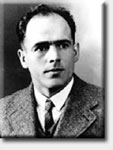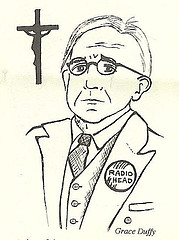As Roman Catholics who love the Church, we listened closely to Pope John Paul II who called the 2003 Iraq War “a defeat for humanity” and to Pope Benedict XVI who said, “There were not sufficient reasons to unleash a war against Iraq,” and went on to say, “We should be asking ourselves if it is still licit to admit the very existence of a just war.”
We remember that, despite the Vatican’s clear opposition to the Iraq War, only one American Bishop, Most Rev. John Michael Botean, condemned it. In a 2003 Lenten Pastoral Letter, Bishop Botean called the Iraq War “objectively grave evil, a matter of mortal sin.”
On March 19, the Iraq War will enter its fifth year. More than 150,000 Iraqi civilians and nearly 4,000 American soldiers have perished. Hundreds of thousands of our sisters and brothers have been injured, orphaned, or left homeless.
We cannot help but wonder if this war could have been prevented with a stronger voice of opposition from all of us in the American Catholic Church. We admit our own complicity by our failure to raise our own voices more forcefully. But, even now, we believe that the voice of our Church can help end the bloodshed.
 Therefore, inspired by the witness of Blessed Franz Jagerstatter, we join concerned Catholics in twelve other dioceses around the United States to call for a Lenten prayer and fast for peace. Like Jagerstatter, the only known Roman Catholic to refuse service in Hitler’s military during World War II, we believe that the Church must not stay “silent in the face of what is happening.” Starting on Ash Wednesday, we invite all people of conscience to join us at Saint Paul’s Cathedral for midday Mass each weekday, followed by a peace vigil outside the church and, shortly thereafter, at the nearby United States Federal Building. We will conclude our prayer and fasting during Holy Week on March 19th with a special Catholic peace witness at the Federal Building.
Therefore, inspired by the witness of Blessed Franz Jagerstatter, we join concerned Catholics in twelve other dioceses around the United States to call for a Lenten prayer and fast for peace. Like Jagerstatter, the only known Roman Catholic to refuse service in Hitler’s military during World War II, we believe that the Church must not stay “silent in the face of what is happening.” Starting on Ash Wednesday, we invite all people of conscience to join us at Saint Paul’s Cathedral for midday Mass each weekday, followed by a peace vigil outside the church and, shortly thereafter, at the nearby United States Federal Building. We will conclude our prayer and fasting during Holy Week on March 19th with a special Catholic peace witness at the Federal Building.
We hope and pray that this witness in Worcester and other dioceses around the country will draw the Church closer to the nonviolent Christ and help our nation to end the Iraq War and Occupation.
 Last night was the US premiere of “A Journey to Kreisau,” a dramatic presentation about Nazi resister Helmuth James Graf von Moltke, written by Worcester theater icon Marc P. Smith.
Last night was the US premiere of “A Journey to Kreisau,” a dramatic presentation about Nazi resister Helmuth James Graf von Moltke, written by Worcester theater icon Marc P. Smith. Therefore, inspired by the witness of Blessed
Therefore, inspired by the witness of Blessed  On October 9, the British rock band Radiohead shook up the music industry by offering its new album, “In Rainbows,” online for whatever fans wanted to pay. The next morning, The Boston Globe reported not only that tens of thousands of CDs had been downloaded under the risky plan, but that the album was pretty good to boot. On the
On October 9, the British rock band Radiohead shook up the music industry by offering its new album, “In Rainbows,” online for whatever fans wanted to pay. The next morning, The Boston Globe reported not only that tens of thousands of CDs had been downloaded under the risky plan, but that the album was pretty good to boot. On the 
![IMG_0067[1]](http://farm2.static.flickr.com/1272/1287757446_af359aad8e_m.jpg)